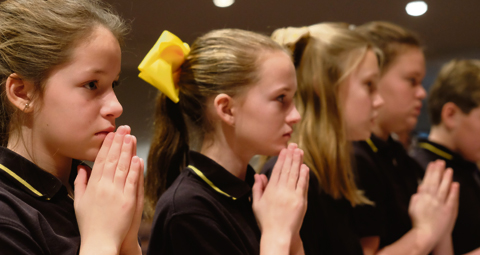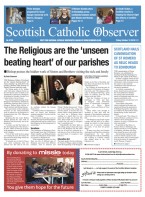BY Ian Dunn | April 7 2017 | ![]() 0 COMMENTS
0 COMMENTS ![]() print
print

Academics criticise ‘suspect’ study of Catholic schools
Publication Date: 2017-04-07
Humanist society-funded study claimed religious ethos of schools ‘has no impact’ on attainment
Leading academics have questioned an ‘extremely suspect’ report that suggested there is little academic difference between Catholic and non-denominational schools in Scotland.
The report, Autonomy in the Right Place, released this week by the left-wing think tank IPPR Scotland, was financially sponsored by the Humanist Society Scotland, which seeks to end state-funded Catholic education.
It claims that there is essentially no difference between denominational and non-denominational schools in Scotland in regards to levels of literacy, numeracy and numbers of pupils getting three Highers.
However, professor Lindsay Patterson, an expert in education policy at the University of Edinburgh, said the report ‘should not be dignified with the word research as it is statistically extremely suspect, not peer reviewed and would not pass muster as academic research.’
“This report ignores 40 years of good quality research by sociologists and others,” he said. “It ignores the good quality survey of Scottish school leavers, which gives data about individuals and treats 51 Catholic schools as if they were single entities.
“The general conclusion of a great deal of evidence in peer-reviewed research is that there’s a link between Catholic schools and high attainment. Catholic schools are a fantastic success story going back eight decades.”
Limited data
Professor Stephen McKinney, leader of the research and teaching group, creativity, culture and faith, at the University of Glasgow’s School of Education, said there needed to be considerably more study in the area before any firm conclusions could be drawn.
“The authors of this study quite rightly point out the limited nature of their data,” he said. “We would be looking for a more refined conception of attainment, not just limited to numeracy, literacy and three Highers.
“Further, the discussion should be framed around the broader range of positive school leaver destinations—the discussion should be about attainment and achievement, focusing on the young people who go on to a variety of positive destinations after school.”
Professor Tony Finn, also at the University of Glasgow, and a former secondary headteacher, agreed that the report’s arguments were not conclusive. “I don’t think supporters of Catholic schools have ever argued than they are better than other schools,” he said. “My view is that all schools can succeed provided the right conditions are in place.”
Professor Finn said that in preparing for the 2014 Cardinal Winning lecture he had undertaken a survey of HMI inspections of Scottish schools from 2012-2014. Inspections take a broad view of a school’s qualities and achievements.
“The survey showed that Catholic schools generally attained higher inspection grades than other schools,” he said, “with many denominational schools achieving very good or excellent grades. Of course, some Catholic schools could, and should, do better but the overall pattern of achievement in Catholic schools is good.”
Authors’ response
A spokesman for the IPPR Scotland think tank said that though the report was financially sponsored by the Humanist Society Scotland, ‘the media, sponsors and others are free to interpret our research as they see fit, just as IPPR is free from any undue influence from sponsors, as our funding contracts stipulate.’
“The findings of Autonomy in the Right Place show that the current evidence is insufficient to suggest either denominational or non-denominational schools have better attainment levels, both before and after you control for intake,” he said. “However, as the report makes clear, better data— such as a value added metric—may make it possible to identify a meaningful difference in the future.”
The spokesman also called for the devolution of new powers to all schools to help close the attainment gap as well as ‘the creation of new regional education partnerships to introduce a culture of evidence, and moves to poverty-proof the school day, week and year.’
“It is through these governance changes that the evidence suggests we have the best chance of helping to close the attainment gap,” he said.
—This story ran in full in the April 7 edition print of the SCO, available in parishes.











